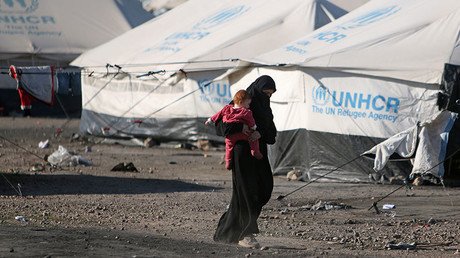US to send heavier weapons to Syrian Kurds and reassures NATO ally, Turkey – Pentagon
The Department of Defense has confirmed delivery of heavier weapons to US-allied Kurdish fighters, for the upcoming ‘long and difficult’ battle to retake the Syrian city of Raqqa from ISIS. The Pentagon has also offered protection to its NATO ally, Turkey.
“That’s not to say we all walk into the room with exactly the same appreciation of the problem or the path forward,” Mattis told reporters in Denmark after meeting with officials from more than a dozen nations also fighting IS.
“We’re going to sort it out,” Mattis said. “We’ll figure out how we’re going to do it.”
US Secretary of Defense James Mattis is meeting with Turkish officials in Copenhagen, Denmark, on Tuesday to work out differences over the US’s continued support for Syrian Kurds against Islamic State (IS, formerly ISIS/ISIL) fighters and efforts to retake Raqqa. Turkey considers them an extension of a banned terrorist group on its territory.
READ MORE: Erdogan vows ‘good surprises’ & more Turkish ops in Syria as Euphrates Shield ‘ends’
The weapons shipment was also confirmed by the White House on Tuesday.
"Yesterday, the president authorized the department of defense to equip Kurdish elements of the Syrian Democratic Forces as necessary to ensure a clear victory over ISIS in Raqqa," White House press secretary, Sean Spicer said, adding that Washington is "aware of the security concerns of our coalition partners in Turkey."
Spicer said the US "reassures the people and the government of Turkey that the US is committed to preventing additional security risks and protecting our NATO ally."
Wrath of Euphrates Op: US troops spotted near Raqqa frontline (EXCLUSIVE) https://t.co/R6N57Bga3J@LizziePhelanpic.twitter.com/cCEZlCzDDw
— RT (@RT_com) March 31, 2017
Back in February, General Joseph Votel, commander of the US forces in the Middle East, after visiting the Raqqa frontline told reporters Kurdish-led Syrian Democratic Forces need more than AK-47s weapons in the fight against Islamic State (IS, formerly ISIS/ISIL).
“Anti-tank weapons systems to address the vehicle-born IEDS. Certainly mortars would be something of help,” Votel said, according to CBS News. “Things that they would need of a force that’s going to conduct an assault.”
READ MORE: Syria safe zones ‘a viable concept’ top US military commander says
Syrian Kurds have complained that while asking for heavier weapons all the US has supplied are small arms and ammunition.
In March, an RT crew noticed US soldiers embedded with Syrian Kurds just miles away from the Raqqa frontline, at the Tabqa Dam on the Euphrates.
“We managed to capture these US Marines leaving the frontline before being ordered to stop filming,” RT’s Lizzie Phelan said.
The Pentagon has insisted that its forces will be kept away from the frontline and the US is taking an advisory role to “train, advise and assist.” The Obama administration has promised to keep American soldiers out of harm’s way and away from the frontline.
The Trump administration is shifting towards a closer engagement with IS. What started as 50 US Special Forces personnel sent to Syria in 2015, has now grown to 1,000 US special operators, Marines and Army Rangers in Northern Syria, and the number might continue to increase.
Capturing the Tabqa Dam is vital for US-led forces in isolating the area around Raqqa and eventually taking the city. US Marines, along with their military equipment, arrived in northern Syria earlier this year to help the SDF, a multi-ethnic force consisting of Kurdish and Arab fighters to prepare for the offensive.
The northern part of the dam is under the control of Syrian Democratic Forces, backed by American troops. IS terrorists, however, still control the most crucial parts of the dam in the south, which includes the floodgates, the control room and the hydroelectric plant.
A full list of equipment wasn't immediately available, but officials had indicated in recent days that 120mm mortars, machines guns, ammunition and light armored vehicles were among the possibilities. They said the US would not provide artillery or surface-to-air missiles.
While the US officials described no firm timeline, the intention is to provide the new weapons to the Syrian Kurds as soon as possible, AP reported.













